Surgery for an Achilles Tendon Rupture
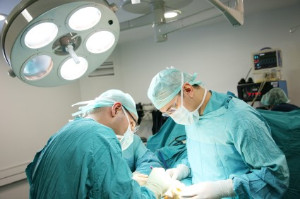
The Achilles tendon plays an essential role in your daily movements, facilitating activities like running, jumping, and even just walking. This tendon connects the heel bones to the calf muscles, allowing you to lift your heels and push up on your toes with ease. However, when faced with a ruptured or torn Achilles tendon, surgical intervention may be necessary to restore functionality and reduce the risk of re-rupture. An Achilles tendon rupture can occur during activities that involve sudden, forceful movements, or it may happen from chronic wear and tear. After such an injury, surgical options are required to reattach the torn ends of the tendon. The two primary options are open surgery and percutaneous surgery. Open surgery involves a single large incision at the back of the leg, while percutaneous surgery utilizes several smaller incisions. Surgeons may opt to wait a week post- injury to allow swelling to decrease before proceeding with either approach. In both cases, the surgeon sews the tendon back together through the incisions. Rehabilitation from Achilles tendon surgery is likely to take between six and nine months. For more information about managing an Achilles tendon rupture, it is suggested that you make an appointment with a podiatrist.
Achilles tendon injuries need immediate attention to avoid future complications. If you have any concerns, contact one of our podiatrists of PA Foot & Ankle Associates. Our doctors can provide the care you need to keep you pain-free and on your feet.
What Is the Achilles Tendon?
The Achilles tendon is a tendon that connects the lower leg muscles and calf to the heel of the foot. It is the strongest tendon in the human body and is essential for making movement possible. Because this tendon is such an integral part of the body, any injuries to it can create immense difficulties and should immediately be presented to a doctor.
What Are the Symptoms of an Achilles Tendon Injury?
There are various types of injuries that can affect the Achilles tendon. The two most common injuries are Achilles tendinitis and ruptures of the tendon.
Achilles Tendinitis Symptoms
- Inflammation
- Dull to severe pain
- Increased blood flow to the tendon
- Thickening of the tendon
Rupture Symptoms
- Extreme pain and swelling in the foot
- Total immobility
Treatment and Prevention
Achilles tendon injuries are diagnosed by a thorough physical evaluation, which can include an MRI. Treatment involves rest, physical therapy, and in some cases, surgery. However, various preventative measures can be taken to avoid these injuries, such as:
- Thorough stretching of the tendon before and after exercise
- Strengthening exercises like calf raises, squats, leg curls, leg extensions, leg raises, lunges, and leg presses
If you have any questions please feel free to contact one of our offices located in Allentown, Easton, Northampton, and Chew Street in Allentown, PA . We offer the newest diagnostic tools and technology to treat your foot and ankle needs.
Understanding the Causes of Nocturnal Foot Pain
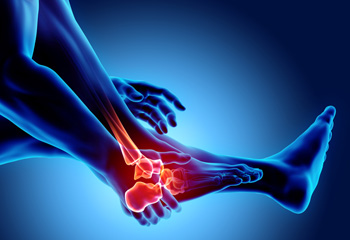
If you have ever experienced the discomfort of foot pain that strikes at night, you are not alone. This phenomenon can be both puzzling and distressing, disrupting precious sleep. There are several potential reasons why your feet can ache during the nighttime hours. One common cause of nighttime foot pain is plantar fasciitis, a condition that involves inflammation of the thick band of tissue that runs along the bottom of your foot. This inflammation can become more pronounced when you rest, leading to pain when you try to sleep. Another possible culprit is neuropathy, a condition characterized by nerve damage. Neuropathy can cause tingling, burning, and sharp pains in the feet, often worsening at night. Diabetes and other underlying medical conditions can contribute to the development of neuropathy. Restless Leg Syndrome, or RLS, is yet another contributor to nocturnal foot pain. Those with RLS experience an irresistible urge to move their legs, often accompanied by uncomfortable sensations like tingling or aching in the feet. This can disrupt sleep and lead to foot discomfort. Ii you are experiencing nighttime foot pain, it is suggested that you consult a podiatrist, who can identify the underlying cause and offer appropriate treatment methods.
Foot Pain
Foot pain can be extremely painful and debilitating. If you have a foot pain, consult with one of our podiatrists from PA Foot & Ankle Associates. Our doctors will assess your condition and provide you with quality foot and ankle treatment.
Causes
Foot pain is a very broad condition that could be caused by one or more ailments. The most common include:
- Bunions
- Hammertoes
- Plantar Fasciitis
- Bone Spurs
- Corns
- Tarsal Tunnel Syndrome
- Ingrown Toenails
- Arthritis (such as Gout, Rheumatoid, and Osteoarthritis)
- Flat Feet
- Injury (from stress fractures, broken toe, foot, ankle, Achilles tendon ruptures, and sprains)
- And more
Diagnosis
To figure out the cause of foot pain, podiatrists utilize several different methods. This can range from simple visual inspections and sensation tests to X-rays and MRI scans. Prior medical history, family medical history, and any recent physical traumatic events will all be taken into consideration for a proper diagnosis.
Treatment
Treatment depends upon the cause of the foot pain. Whether it is resting, staying off the foot, or having surgery; podiatrists have a number of treatment options available for foot pain.
If you have any questions, please feel free to contact one of our offices located in Allentown, Easton, Northampton, and Chew Street in Allentown, PA . We offer the newest diagnostic and treatment technologies for all your foot care needs.
Are Bunions Affecting Your Everyday Life?
Treatment of Sesamoiditis
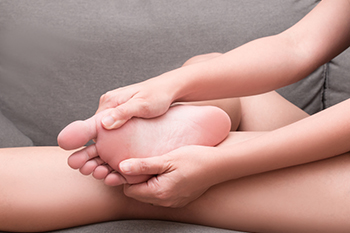
There are two sesamoid bones located beneath the big toe which aid its movement. Problems with these sesamoid bones can vary from acute injuries such as turf toe, where the toe excessively bends due to fractures. Pain may also arise from sesamoiditis, an inflammation of the sesamoids, or from arthritis affecting the toe. Symptoms of acute sesamoid issues can manifest as intense pain and difficulty in walking, while chronic conditions may cause persistent pain under the big toe, which can be aggravated by certain shoes or activities, hinting at sesamoiditis. Diagnosis typically involves examining the patient's medical history and symptoms, supported by X-rays or more detailed scans such as an MRI or CT scan. Treatment strategies for sesamoid problems range from wearing supportive footwear and activity modifications. If these measures fail, surgery might be considered, which could include removing the sesamoid bones or repairing them. If you have foot pain of any sort, it is strongly suggested that you make an appointment with a podiatrist who can accurately diagnose the problem and offer treatment options that can help you return to normal activity levels.
Sesamoiditis is an unpleasant foot condition characterized by pain in the balls of the feet. If you think you’re struggling with sesamoiditis, contact one of our podiatrists of PA Foot & Ankle Associates. Our doctors will treat your condition thoroughly and effectively.
Sesamoiditis
Sesamoiditis is a condition of the foot that affects the ball of the foot. It is more common in younger people than it is in older people. It can also occur with people who have begun a new exercise program, since their bodies are adjusting to the new physical regimen. Pain may also be caused by the inflammation of tendons surrounding the bones. It is important to seek treatment in its early stages because if you ignore the pain, this condition can lead to more serious problems such as severe irritation and bone fractures.
Causes of Sesamoiditis
- Sudden increase in activity
- Increase in physically strenuous movement without a proper warm up or build up
- Foot structure: those who have smaller, bonier feet or those with a high arch may be more susceptible
Treatment for sesamoiditis is non-invasive and simple. Doctors may recommend a strict rest period where the patient forgoes most physical activity. This will help give the patient time to heal their feet through limited activity. For serious cases, it is best to speak with your doctor to determine a treatment option that will help your specific needs.
If you have any questions please feel free to contact one of our offices located in Allentown, Easton, Northampton, and Chew Street in Allentown, PA . We offer the newest diagnostic and treatment technologies for all your foot and ankle needs.
Managing Intoeing in Children's Feet
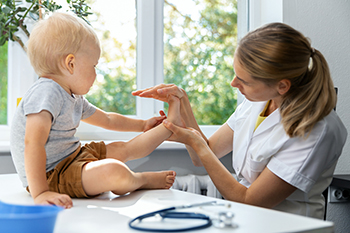
One foot condition parents may encounter in their child’s feet is known as metatarsus adductus, recognizable when a child's foot looks like it's forming a C shape. Known by other names, such as metatarsus varus or pes adductus, it is a condition your child might have from birth. The front part of the foot, or the forefoot, points inward toward the back part of the foot. This makes the inside edge of the foot look curved and the outside edge look more rounded. Metatarsus adductus can be confused with other foot problems like skewfoot, which has a bump on the outside edge, or clubfoot, where the whole foot is turned inwards and down. Sometimes, this condition fixes itself as your child grows, but regular check-ups with a podiatrist are essential for monitoring progress. This medically trained foot doctor can suggest simple stretching exercises to help the foot align correctly. In addition, your podiatrist can prescribe custom shoe inserts for extra support and help correct the foot's shape. In more severe cases, your child's foot might be gently cast to guide it into the right position. Surgery may be suggested in extreme cases. With the right care and guidance, your child can have happy, healthy feet. If your child exhibits intoeing, it is suggested that you make an appointment with a podiatrist for a complete examination and a treatment plan.
Congenital foot problems require immediate attention to avoid future complications. If you have any concerns, contact one of our podiatrists of PA Foot & Ankle Associates. Our doctors can provide the care you need to keep you pain-free and on your feet.
Congenital foot problems are deformities affecting the feet, toes, and/or ankles that children are born with. Some of these conditions have a genetic cause while others just happen. Some specific foot ailments that children may be born with include clubfeet, polydactyly/macrodactyly, and cleft foot. There are several other foot anomalies that can occur congenitally. What all of these conditions have in common is that a child may experience difficulty walking or performing everyday activities, as well as trouble finding footwear that fits their foot deformity. Some of these conditions are more serious than others. Consulting with a podiatrist as early as possible will help in properly diagnosing a child’s foot condition while getting the necessary treatment underway.
What are Causes of Congenital Foot Problem?
A congenital foot problem is one that happens to a child at birth. These conditions can be caused by a genetic predisposition, developmental or positional abnormalities during gestation, or with no known cause.
What are Symptoms of Congenital Foot Problems?
Symptoms vary by the congenital condition. Symptoms may consist of the following:
- Clubfoot, where tendons are shortened, bones are shaped differently, and the Achilles tendon is tight, causing the foot to point in and down. It is also possible for the soles of the feet to face each other.
- Polydactyly, which usually consists of a nubbin or small lump of tissue without a bone, a toe that is partially formed but has no joints, or an extra toe.
- Vertical talus, where the talus bone forms in the wrong position causing other bones in the foot to line up improperly, the front of the foot to point up, and the bottom of the foot to stiffen, with no arch, and to curve out.
- Tarsal coalition, when there is an abnormal connection of two or more bones in the foot leading to severe, rigid flatfoot.
- Cleft foot, where there are missing toes, a V-shaped cleft, and other anatomical differences.
- Macrodactyly, when the toes are abnormally large due to overgrowth of the underlying bone or soft tissue.
Treatment and Prevention
While there is nothing one can do to prevent congenital foot problems, raising awareness and receiving neonatal screenings are important. Early detection by taking your child to a podiatrist leads to the best outcome possible.
If you have any questions please feel free to contact one of our offices located in Allentown, Easton, Northampton, and Chew Street in Allentown, PA . We offer the newest diagnostic tools and technology to treat your foot and ankle needs.
Foot Blisters Are a Common Foot Ailment
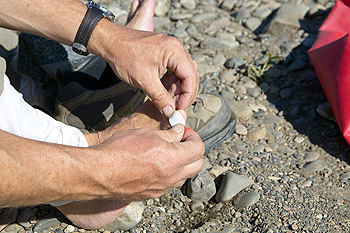
Foot blisters are pockets of fluid that form on the skin's surface, and can turn a pleasant walk or workout into a painful experience. These common nuisances are often the result of friction or repeated rubbing on the skin. When the skin experiences excessive pressure or friction, the top layer separates from the layers beneath, trapping a small amount of fluid in the newly formed pocket. Blisters can also be caused by wearing ill-fitting shoes, footwear that rubs against the skin, high levels of moisture, or extended periods of physical activity. Understanding the factors that contribute to blister formation is essential for prevention. If you have developed a blister on your foot that has become problematic, it is suggested that you speak with a podiatrist who can properly treat it and offer you effective prevention methods.
Blisters are prone to making everyday activities extremely uncomfortable. If your feet are hurting, contact one of our podiatrists of PA Foot & Ankle Associates. Our doctors can provide the care you need to keep you pain-free and on your feet.
Foot Blisters
Foot blisters develop as a result of constantly wearing tight or ill-fitting footwear. This happens due to the constant rubbing from the shoe, which can often lead to pain.
What Are Foot Blisters?
A foot blister is a small fluid-filled pocket that forms on the upper-most layer of the skin. Blisters are filled with clear fluid and can lead to blood drainage or pus if the area becomes infected.
How Do Blisters Form?
Blisters on the feet are often the result of constant friction of skin and material, usually by shoe rubbing. Walking in sandals, boots, or shoes that don’t fit properly for long periods of time can result in a blister. Having consistent foot moisture and humidity can easily lead to blister formation.
Prevention & Treatment
It is important to properly care for the affected area in order to prevent infection and ease the pain. Do not lance the blister and use a Band-Aid to provide pain relief. Also, be sure to keep your feet dry and wear proper fitting shoes. If you see blood or pus in a blister, seek assistance from a podiatrist.
If you have any questions, please feel free to contact one of our offices located in Allentown, Easton, Northampton, and Chew Street in Allentown, PA . We offer the newest diagnostic and treatment technologies for all your foot care needs.
Are You Suffering From Ingrown Toenails?
Effective Exercises for Foot and Ankle Pain
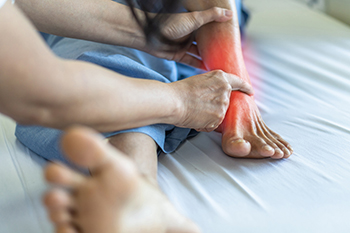
Managing foot and ankle pain can be unsettling, as it hampers daily activities and quality of life. Fortunately, there are exercises you can incorporate into your routine that may help to alleviate discomfort and promote healing. Stretching exercises, such as calf stretches and ankle circles, can improve flexibility and reduce tension. Toe scrunches, where you simply curl and release your toes, can help strengthen the muscles in your feet. Rolling a tennis ball or frozen water bottle under your foot can provide a soothing massage and alleviate pain. Balancing exercises, such as standing on one foot, can enhance stability and prevent future injuries. Chronic pain and discomfort from the ankle or foot warrant a visit to the podiatrist. If you are experiencing a foot or ankle condition, it is suggested that you consult with this type of doctor who can recommend foot exercises and stretches that are tailored for you.
Ankle pain can be caused by a number of problems and may be potentially serious. If you have ankle pain, consult with one of our podiatrists from PA Foot & Ankle Associates. Our doctors will assess your condition and provide you with quality foot and ankle treatment.
Ankle pain is any condition that causes pain in the ankle. Due to the fact that the ankle consists of tendons, muscles, bones, and ligaments, ankle pain can come from a number of different conditions.
Causes
The most common causes of ankle pain include:
- Types of arthritis (rheumatoid, osteoarthritis, and gout)
- Ankle sprains
- Broken ankles
- Achilles tendinitis
- Achilles tendon rupture
- Stress fractures
- Bursitis
- Tarsal tunnel syndrome
- Plantar fasciitis
Symptoms
Symptoms of ankle injury vary based upon the condition. Pain may include general pain and discomfort, swelling, aching, redness, bruising, burning or stabbing sensations, and/or loss of sensation.
Diagnosis
Due to the wide variety of potential causes of ankle pain, podiatrists will utilize a number of different methods to properly diagnose ankle pain. This can include asking for personal and family medical histories and of any recent injuries. Further diagnosis may include sensation tests, a physical examination, and potentially x-rays or other imaging tests.
Treatment
Just as the range of causes varies widely, so do treatments. Some more common treatments are rest, ice packs, keeping pressure off the foot, orthotics and braces, medication for inflammation and pain, and surgery.
If you have any questions, please feel free to contact one of our offices located in Allentown, Easton, Northampton, and Chew Street in Allentown, PA . We offer the newest diagnostic and treatment technologies for all your foot care needs.
Symptoms and Causes of Metatarsal Pain
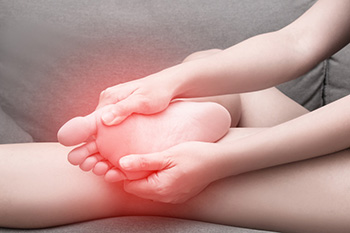
Metatarsalgia, a prevalent foot condition, can disrupt daily life with pain and discomfort. Symptoms of metatarsalgia include sharp, aching, or burning pain in the ball of the foot. This discomfort may extend to the areas around the second, third, or fourth toes. Pain may worsen when standing, walking, or running but eases when resting. Some individuals may experience sharp or shooting pain in their toes, tingling sensations, or the sensation of walking with a pebble in their shoe. Walking barefoot, especially on hard surfaces, can intensify the pain. Metatarsalgia can be due to intense physical activities, such as running or jumping, particularly when combined with improperly fitting or worn-out shoes. Conditions like hammertoes, bunions, and excess body weight can also contribute to metatarsalgia. Furthermore, footwear choices play a role, with high heels, narrow-toed shoes, and non-supportive athletic footwear increasing the risk. Stress fractures in the metatarsals or toe bones and Morton's neuroma can contribute to this condition. If you are experiencing pain or discomfort in the ball of the foot, it is suggested that you make an appointment with a podiatrist for an exam and possible treatment solutions.
Sports related foot and ankle injuries require proper treatment before players can go back to their regular routines. For more information, contact one of our podiatrists of PA Foot & Ankle Associates. Our doctors can provide the care you need to keep you pain-free and on your feet.
Sports Related Foot and Ankle Injuries
Foot and ankle injuries are a common occurrence when it comes to athletes of any sport. While many athletes dismiss the initial aches and pains, the truth is that ignoring potential foot and ankle injuries can lead to serious problems. As athletes continue to place pressure and strain the area further, a mild injury can turn into something as serious as a rupture and may lead to a permanent disability. There are many factors that contribute to sports related foot and ankle injuries, which include failure to warm up properly, not providing support or wearing bad footwear. Common injuries and conditions athletes face, including:
- Plantar Fasciitis
- Plantar Fasciosis
- Achilles Tendinitis
- Achilles Tendon Rupture
- Ankle Sprains
Sports related injuries are commonly treated using the RICE method. This includes rest, applying ice to the injured area, compression and elevating the ankle. More serious sprains and injuries may require surgery, which could include arthroscopic and reconstructive surgery. Rehabilitation and therapy may also be required in order to get any recovering athlete to become fully functional again. Any unusual aches and pains an athlete sustains must be evaluated by a licensed, reputable medical professional.
If you have any questions please feel free to contact one of our offices located in Allentown, Easton, Northampton, and Chew Street in Allentown, PA . We offer the newest diagnostic and treatment technologies for all your foot and ankle needs.
Alternative Treatment for Toenail Fungus
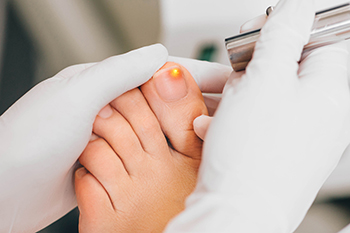
Toenail fungal infections, known as onychomycosis, are typically treated with antifungal medications. This type of infection is hard to cure. A complete cure of toenail fungus is considered an eradication of the fungus and a healthy-looking toenail. Lasers are being used to treat these infections and are being considered as an alternative treatment worthy of consideration. This may be particularly true among older patients, or those with health conditions that make traditional antifungal medications unsuitable or ineffective. If you have toenail fungus and it is not responding to antifungal medicines, it is suggested that you make an appointment with a podiatrist to discuss whether laser treatment may be correct for you.
Laser treatment can be an effective way to get rid of toenail fungus. If you have any questions about laser treatment, consult with one of our podiatrists from PA Foot & Ankle Associates. Our doctors will assess your condition and provide you with quality treatment for fungal nails.
What Are Toenail Fungal Infections?
Onychomycosis, or fungal infection of the nail, is a relatively common and non-serious condition. Around 10 percent of U.S. citizens are afflicted with fungal nails. Common forms of fungus that infect the nail include dermatophytes, yeasts, and molds.
Symptoms of Toenail Fungal Infections Include:
- Nail thickening
- Brittleness of the nail
- Discoloration of the nail
Diagnosis for Fungal Nails
Fungal infections are diagnosed by fungal culture and microscopy. This will rule out any other conditions such as nail trauma, psoriasis, lichen planus, and onychogryphosis.
What Is Laser Treatment?
Laser treatment is a non-invasive, safe, quick, and painless procedure that uses the heat from a laser to kill fungus in the nail. Each infected nail is targeted with a laser for several minutes. The treatment is usually utilized several different times over a select period. During this time, a podiatrist will keep an eye on the infection.
If you have any questions, please feel free to contact one of our offices located in Allentown, Easton, Northampton, and Chew Street in Allentown, PA . We offer the newest diagnostic and treatment technologies for all your foot care needs.
More...
Do Your Child's Feet Hurt?
Causes and Symptoms of Gout
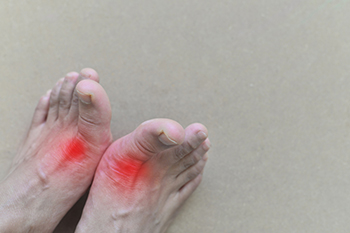
Gout is a type of arthritis characterized by sudden, severe joint pain and inflammation, typically affecting the big toe, although it can occur in other joints as well. Understanding the causes and symptoms of gout is essential for early diagnosis and effective management. Gout is primarily caused by high levels of uric acid in the blood, a condition known as hyperuricemia. Uric acid crystals can accumulate in the joints, leading to painful gout attacks. Several factors can contribute to elevated uric acid levels, including genetics, and a diet rich in purines which are found in red meat, seafood, and alcohol. Additionally, taking certain medications and obesity may lead to developing gout. The symptoms of gout often appear suddenly and include intense joint pain, swelling, redness, and warmth surrounding the affected joint. Gout attacks can be excruciating, and the pain may persist for days or weeks if left untreated. Managing gout involves lifestyle modifications, dietary changes, and medications to lower uric acid levels. Prompt medical attention and understanding the causes and symptoms are crucial for preventing and mitigating the effects of gout. If you are afflicted with gout, it is strongly suggested that you are under the care of a podiatrist who can help you to manage this condition.
Gout is a foot condition that requires certain treatment and care. If you are seeking treatment, contact one of our podiatrists from PA Foot & Ankle Associates. Our doctors will treat your foot and ankle needs.
What Is Gout?
Gout is a type of arthritis caused by a buildup of uric acid in the bloodstream. It often develops in the foot, especially the big toe area, although it can manifest in other parts of the body as well. Gout can make walking and standing very painful and is especially common in diabetics and the obese.
People typically get gout because of a poor diet. Genetic predisposition is also a factor. The children of parents who have had gout frequently have a chance of developing it themselves.
Gout can easily be identified by redness and inflammation of the big toe and the surrounding areas of the foot. Other symptoms include extreme fatigue, joint pain, and running high fevers. Sometimes corticosteroid drugs can be prescribed to treat gout, but the best way to combat this disease is to get more exercise and eat a better diet.
If you have any questions please feel free to contact one of our offices located in Allentown, Easton, Northampton, and Chew Street in Allentown, PA . We offer the newest diagnostic and treatment technologies for all your foot and ankle needs.
Preventive Measures for Toenail Fungus
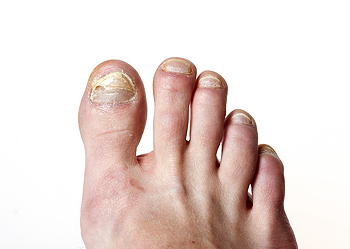
Toenail fungus, also known as onychomycosis, is a common condition that affects countless individuals worldwide. It occurs when fungi, often dermatophytes, enter the nail bed through tiny cracks or cuts in the skin, leading to an infection. The resulting symptoms typically include thickened, discolored nails that may become brittle or crumble over time. Recognizing toenail fungus is essential, as early intervention can prevent further complications. Apart from the visual signs, you may also experience mild pain or discomfort, especially when wearing tight-fitting shoes. To help prevent toenail fungus, it is important to practice proper foot hygiene, such as regularly washing and drying your feet thoroughly. Since fungi thrive in damp environments, be sure your shoes are well-ventilated and moisture-wicking. Additionally, it is beneficial to avoid walking barefoot in public areas, including locker rooms and swimming pools, where the risk of infection is higher. Trimming the nails straight across can also help prevent ingrown nails and potential entry points for fungus. If you suspect you have toenail fungus, it is suggested that you seek prompt treatment from a podiatrist who can offer you treatment methods that are right for you.
For more information about treatment, contact one of our podiatrists of PA Foot & Ankle Associates. Our doctors can provide the care you need to keep you pain-free and on your feet.
Toenail Fungus Treatment
Toenail fungus is a condition that affects many people and can be especially hard to get rid of. Fortunately, there are several methods to go about treating and avoiding it.
Antifungals & Deterrence
Oral antifungal medicine has been shown to be effective in many cases. It is important to consult with a podiatrist to determine the proper regiment for you, or potentially explore other options.
Applying foot powder on the feet and shoes helps keep the feet free of moisture and sweat.
Sandals or open toed shoes – Wearing these will allow air movement and help keep feet dry. They also expose your feet to light, which fungus cannot tolerate. Socks with moisture wicking material also help as well.
If you have any questions please feel free to contact one of our offices located in Allentown, Easton, Northampton, and Chew Street in Allentown, PA . We offer the newest diagnostic tools and technology to treat your foot and ankle needs.
How to Choose the Right Running Shoe

Choosing the perfect pair of running shoes is essential for runners of all levels. Your choice significantly affects comfort, performance, and overall foot health. To make the right selection, start by identifying your foot type, such as neutral, pronated, or supinated. Next, consider cushioning, which should be minimal for a natural feel, maximum for long-distance shock absorption, or moderate for most runners. Shoe stability matters for injury prevention. Those with flat feet or overpronation should opt for stability features like medial posts, while high arches benefit from neutral shoes with cushioning. A proper fit is also important. Leave about a thumb's width of space between your longest toe and the shoe's front. Try on multiple pairs and take them for a test run in-store to assess comfort and stability. Also, consider the type of surface you will be running on, because road, trail, and track running require different shoe types. Running shoes can become a major investment because they should be replaced after 300-500 miles to ensure optimal performance and prevent injuries. For more help with finding the proper running shoe for your feet, it is suggested that you speak to a podiatrist.
You should always make sure your running shoes fit properly in order to avoid injury. For more information, contact one of our podiatrists from PA Foot & Ankle Associates. Our doctors can provide the care you need to keep you pain-free and on your feet.
Choosing the Right Running Shoe for Your Foot Type
Improper shoe sizing can cause a myriad of problems for your feet. Shoes that don’t fit you properly can lead to muscular imbalances in your body, which can result in foot, knee, and hip injuries.
Tips for Finding the Right Running Shoe
- Make sure you have a thumb’s width of wiggle room between the end of your longest toe and the front of the shoe.
- There should be little to no slipping at the heel
- Don’t assume your size in one shoe brand will be your size in another
- Do not lace up your shoes too tightly
- Walk around in the store with your new shoes before you buy them
If you have any questions please feel free to contact our one of our offices located in Allentown, Easton, Northampton, and Chew Street in Allentown, PA . We offer the newest diagnostic and treatment technologies for all your foot and ankle needs.



